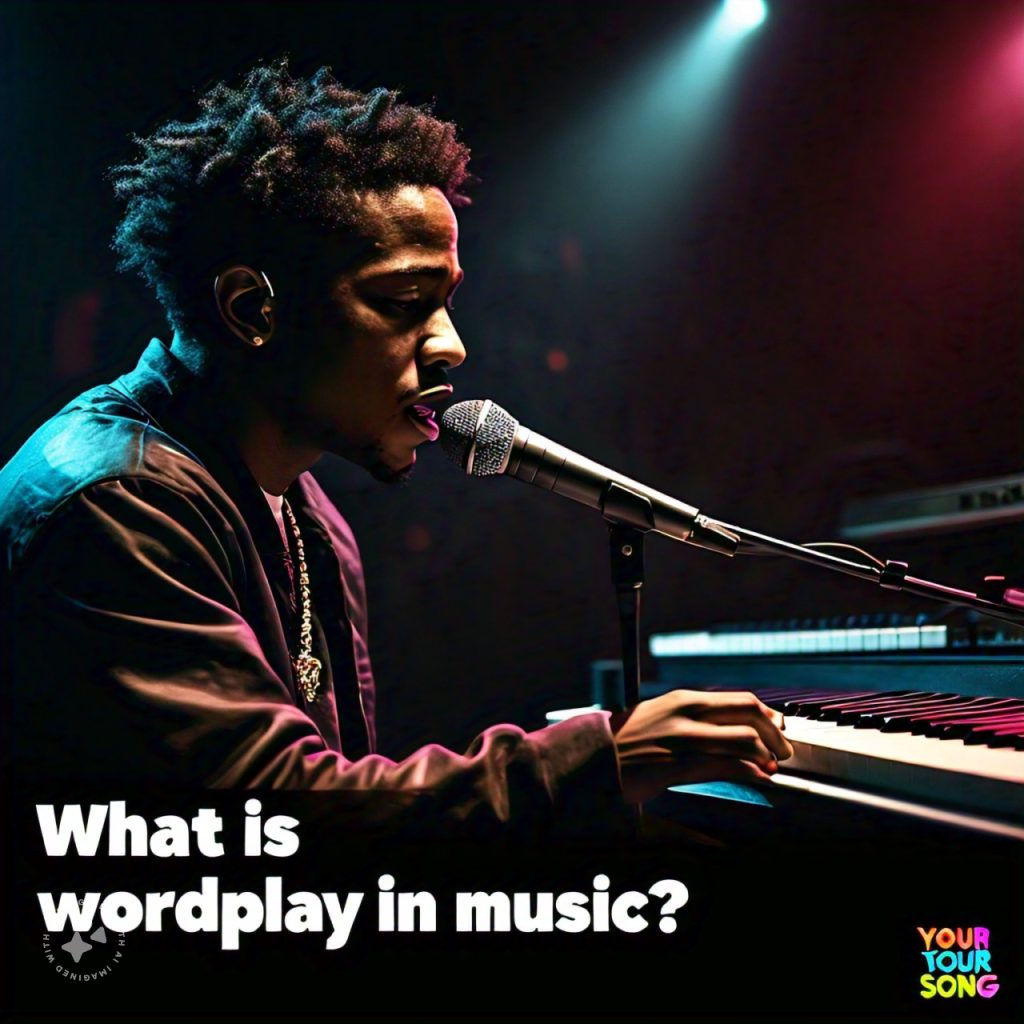In this post, we are going to tell you everything you may need to know about Wordplay in Music and how you can properly use it in your song.
Hey there, music lovers and aspiring artists! I’m Caleb Bob, a singer-songwriter with a trunk full of tour stories and a head full of melodies. For years, I’ve been crafting lyrics and chasing that perfect hook, and one thing that’s always elevated my music is the art of wordplay. Let’s dive deep into this essential songwriting tool, unpack its power, and explore how to weave it into your musical tapestry.
Think of it like a lyrical sprinkle on your sonic sundae. It can be a subtle pun that makes listeners smile or a double entendre that leaves them pondering the hidden message. Wordplay isn’t about making your lyrics feel like a cryptic puzzle; it’s about using language in a way that enhances the emotional impact and memorability of your music.
What Is Wordplay in Music?
Wordplay in music refers to the creative use of language to convey multiple meanings, sounds, or rhythms. It’s a literary device that adds depth, complexity, and emotional resonance to your lyrics. Wordplay can take many forms, including:
- Double meaning: Using a word or phrase with multiple interpretations, like “bank” (financial institution or riverbank).
- Puns: Playing with words that sound similar but have different meanings, like “Why was the math book sad? Because it had too many problems.”
- Alliteration: Repeating initial consonant sounds for a musical effect, like “Sally sells seashells by the seashore.”
- Assonance: Repeating vowel sounds for a musical effect, like “The rain in Spain stays mainly in the plain.”
- Onomatopoeia: Using words that imitate sounds, like “buzz” or “meow.”
Different Types of Wordplay in Music
The beauty of wordplay is its versatility. Here are some of the most common techniques you’ll encounter in music, along with a few examples to illustrate their magic:
- Puns and Homophones: These are words that sound the same but have different meanings. A classic example is Billy Joel’s “We Didn’t Start the Fire,” where he sings, “We didn’t start the fire, it was always burning since the world’s been turning.” The play on “fire” and “desire” adds a layer of complexity to the song’s message.
- Rhyme and Double Entendre: Rhyme is the cornerstone of many musical genres, but it becomes truly captivating when used with a double entendre. A double entendre is a word or phrase with two meanings, one literal and one suggestive. The Beatles were masters of this technique. Listen to “Help!” where they sing, “I need somebody, not just anybody.” The surface meaning is clear, but the double entendre adds a layer of desperation and yearning.
- Metaphors and Similes: These figures of speech compare two things that aren’t alike but share a common quality. Metaphors create a more vivid image (“Her eyes were diamonds”), while similes use “like” or “as” to connect the two things (“Her heart was as cold as ice”). A master of metaphor is Bob Dylan, who paints unforgettable pictures with his words: “The answer, my friend, is blowin’ in the wind” (“Blowin’ in the Wind”).
Examples of Wordplay in Popular Music
Now let’s step outside the theory box and explore how some legendary musicians have used wordplay to elevate their music:
- Hip-Hop: This genre practically thrives on wordplay. From Eminem’s mind-bending rhymes (“I take seven kids from Columbine / Put ’em all in a line / Add an AK-47, a revolver, a nine / A MAC-11 and it oughta solve the problem of mine” – “Rap God”) to Lauryn Hill’s poignant metaphors (“Lost children of a broken generation / Searching for a destination” – “Lost Ones”), hip-hop artists consistently push the boundaries of language in their music.
- Pop Music: Pop music isn’t all bubblegum melodies. Artists like Taylor Swift weave clever wordplay into their relatable lyrics. Take “Shake It Off,” where she sings, “Cause the haters gonna hate hate hate hate hate / Baby, I’m gonna shake shake shake shake shake.” The repetition emphasizes the message while also creating a catchy hook.
- Rock and Roll: Even the world of rock and roll is still subject to the power of wordplay. David Bowie was a lyrical chameleon, and songs like “Life on Mars?” are filled with surreal imagery and clever wordplay that perfectly captures the song’s otherworldly vibe.
These are just a few examples, and the possibilities are endless. The key is to find the type of wordplay that resonates with your style and the message you want to convey.
Why Use Wordplay in Your Music?
Incorporating wordplay into your lyrics offers several benefits:
- Enhancing creativity: Wordplay challenges you to think outside the box and explore new ideas.
- Adding depth and complexity: Multiple meanings and interpretations invite listeners to engage more deeply with your music.
- Encouraging interpretation: Wordplay leaves room for listeners to connect with your lyrics on a personal level.
How to Use Wordplay in Your Music

Alright, aspiring songwriters, let’s get down to brass tacks! Here are some tips to help you incorporate wordplay into your music:
- Brainstorming Ideas: Immerse yourself in music that effectively uses wordplay. Listen to your favorite artists and see how they manipulate language. Please pay attention to how they use puns, rhymes, and metaphors to create impact. Once you’ve got your inspiration flowing, grab a notebook and start jotting down wordplay ideas. Feel free to experiment with different sounds and meanings.
- Practice Makes Perfect: The more you write, the more comfortable you’ll become with wordplay. Keep going even if your first attempts feel clunky. Keep experimenting, have fun with language, and refine your skills over time.
- Techniques for Seamless Integration: Wordplay shouldn’t feel forced. Here are some ways to integrate it seamlessly into your lyrics:
- Thematic Connection: Let the wordplay tie back to the central theme of your song. For example, if you’re writing a song about heartbreak, you might use a metaphor like “My heart is a shattered mirror, reflecting a broken dream.” This metaphor reinforces the feeling of emotional devastation.
- Rhyme Schemes: Rhyme schemes are the foundation of many songs, but consider using unexpected rhymes or internal rhymes (rhymes within a line) to surprise your listeners. This can add a playful element and make your lyrics more memorable.
- Double Meanings: Double entendres can add a layer of depth and intrigue to your lyrics. Just be sure the double meaning isn’t so obscure that listeners miss it entirely.
Remember:
- Clarity vs. obscurity: Find a balance between clever wordplay and clear communication.
- Avoid clichés: Steer clear of overused wordplay devices that may come across as cheesy or predictable.
- Integrate with melody and rhythm: Wordplay should complement, not overpower, your music.
Conclusion
Wordplay is a powerful tool in the songwriter’s arsenal. It can add layers of meaning, humor, and memorability to your music. By understanding the different types of wordplay, exploring how other artists use it, and practicing your techniques, you can elevate your songwriting and connect with listeners on a deeper level. So, unleash your inner wordsmith, have fun with language, and watch your music come alive with the magic of wordplay!
Final Tips
- Read widely: Explore literature, poetry, and lyrics from various genres to develop your wordplay skills.
- Experiment with language: Play with words, sounds, and rhythms to find your unique voice.
- Collaborate with others: Co-writing with fellow musicians can help you discover new wordplay techniques and approaches.
By embracing the art of wordplay, you’ll unlock new possibilities in your music and connect with your audience on a deeper level. So go ahead, get creative, and play with words!


